Dates: June 23 – 28, 1870
Location: William Ingraham Farm, Wasioja Township, Dodge Co., MN
Find it today: Map
East of Wasioja on County Road 16, it is the first farm on the south side of the road. They have a sign posted in the front yard stating that it’s the site of the first Minnesota Seventh-day Adventist Camp Meeting. (Please be respectful that this is private property – thanks!)
The baptisms: Camp meeting baptisms were conducted in the Zumbro River.

Photo: © 2018 Isaac Jones
HERE AND HEREABOUTS – The Seventh-Day Adventist will hold a camp meeting at Wasioja, in this county, commencing June 23d, 1870, and continuing five days. A number of distinguished speakers are expected to be in attendance. A cordial invitation is extended to all.
Dodge County Republican, June 10, 1870, 1.

MINNESOTA STATE CONFERENCE. – THE next annual session of the Minnesota State Conference of Seventh-day Adventists, will be held at Wasioja in connection with the Camp-meeting, June 23-28, 1870. We hope every Church which now belongs or wishes to belong to the Conference will be represented by delegates. They should come prepared to give written reports of their standing their loses and additions during the year, also the yearly amount of the S. B. fund. We hope all the churches will send in their arrearages on S. B. fund to the close of the Conference year, and also come prepared to meet camp-meeting expenses.
MINNESOTA STATE CONF. COMMITTEE.
Review and Herald, May 17, 1870, 176.
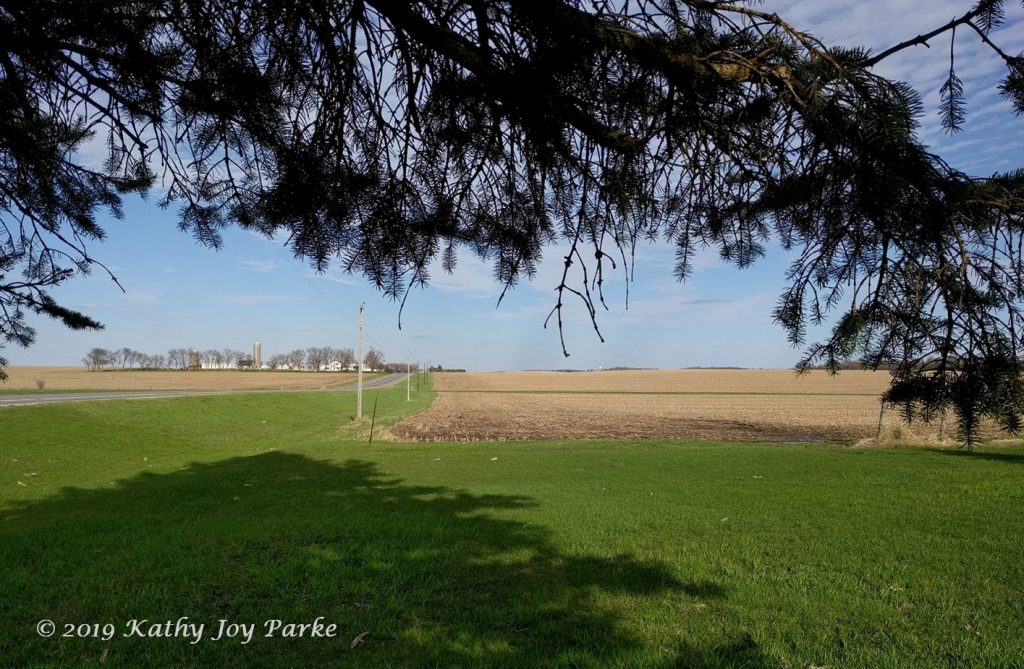
Photo: © 2019 Kathy Joy Parke
WESTERN TOUR – TRIP UP THE MISSISSIPPI. – Fourth-day, June 24 [sic] (it was actually June 22), we left the good pilgrim’s tavern, at the home of Bro. and Sr. Higley, at 4 A. M., and hastened to Nora station, where we took the train at 4:40. The extreme drought fills the ears with black, prairie dust, which is very disagreeable. But we were soon, at Dunleith, where, about 9 A. M., we took the steamer Minnesota for Winona. Washed and brushed we entered upon our voyage up the Mississippi. The boat is a good one, and all connected with her seem attentive and kind. The clerk readily gave half-fare tickets to all preachers who give evidence that they are such. Our Michigan passes were sufficient proof that we were men worthy of their usual deductions. Mrs. W. found a special friend in the worthy stewardess.
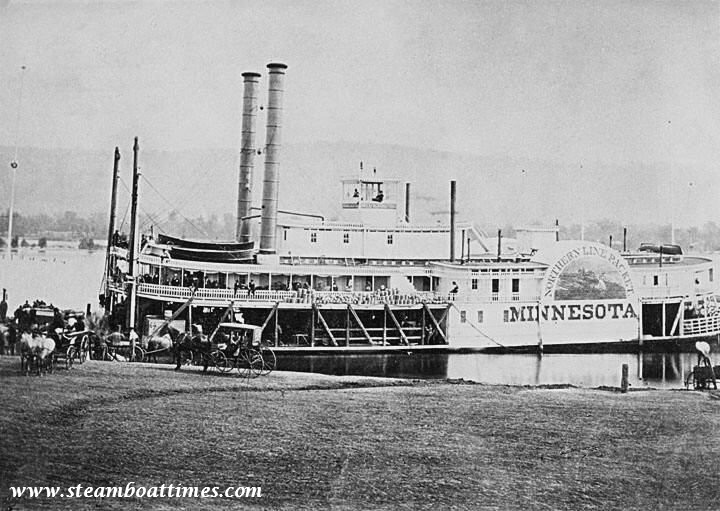
Similar to that traveled on by the Whites
Photo: www.steamboattimes.com
The number of passengers was some less than a hundred. Most of them appear intelligent. A young man called me Eld. White, and says he heard us at Johnstown, Wis., in the fall of 1868. Some are on their way to Minnesota for their health. Several times we have been drawn out upon the subject of health, which calls the crowd, and leads to very interesting conversations.

Photo: Ellen G. White
Estate, Inc.
Here is an intelligent gentleman from Ohio, a nervous dyspeptic, who eats fashionably, drinks tea and coffee, and uses tobacco. His wife is a fine looking, and fine appearing lady, and seems very anxious about her husband. These are among our most earnest listeners.
The day is very hot; Mrs. W. is writing. Poor woman! This almost eternal writing for this one and that, when she should rest, and enjoy the beautiful scenery, and the pleasant society, seems too bad, but God blesses and sustains, and we must be reconciled.
We have, in our upward trip, met many, and very large, rafts of lumber drifting down the river. On them are erected board shanties in which the men cook and sleep. We observed, as we passed a large raft, in which there were probably forty men, one man swimming toward the steamer, while others were swinging their hats, and crying, “Papers!” These were immediately thrown overboard, and gathered up by the swimmer and taken to the raft. In a few moments these could be dried, ready to be read.

Photo: MN Historical Society,
Anoka County Historical Society
This gave Willie a new idea. He immediately went to my traveling bag for present-truth books and cord, and to the fireman for stone coal. Between two pamphlets he would tie a piece of coal, and as we passed within throwing distance, we would land the books quite on to the rafts. They were eagerly seized by the sturdy lumbermen. God bless the truth thus distributed.
As the sun sank behind the bluffs on the Iowa side, the air grew cooler, and the evening was delightful.
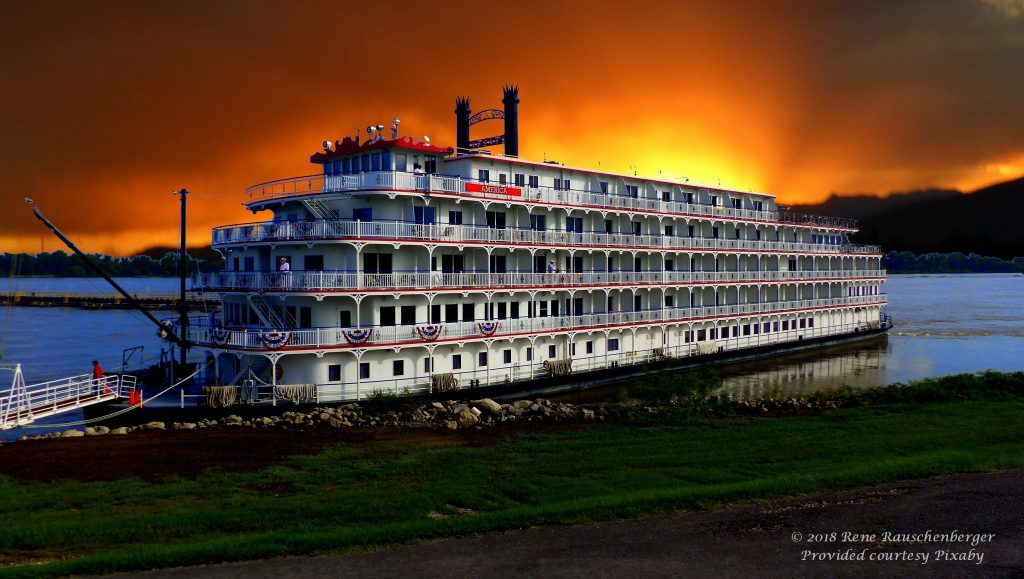
© 2018 Rene Rauschenberger
Provided courtesy Pixabay
Image by RENE RAUSCHENBERGER from Pixabay
Our company was seated together in front of the clerk’s office, on the bow of the boat, when we struck up that good tune and hymn “Resting By and By”. This we did for our own diversion and devotion, not expecting to attract attention. But as soon as we had finished two verses, and paused, hands were clapped and feet were tapped, all around us, and as we looked around, our fellow-passengers were all gathered for ward, standing just over our shoulders, calling out “Give us some more!” “Try that again!”
“Resting By and By” refers to the early Advent hymn of that title:
When faint and weary toiling, The sweat-drops on my brow;
I long to rest from labor, To drop the burden now,
There comes a gentle chiding, To quell each mourning sigh:
“Work while the day is shining; There’s resting by and by.”
Chorus:
Resting by and by, There’s resting by and by;
We shall not always labor, We shall not always cry;
The end is drawing nearer, The end for which we sigh;
We’ll lay our heavy burdens down; There’s resting by and by.
This life to toil is given, And he improves it best
Who seeks by patient labor To enter into rest;
Then Pilgrim, worn and weary, Press on, the goal is nigh;
The prize is straight before thee There’s resting by and by.
(Chorus)
Nor ask when, overburdened, You long for friendly aid,
“Why idle stands my brother, No yoke upon him laid?”
The Master bids him tarry, And dare you ask him why?
“Go labor in my vineyard, There’s resting by and by.”
(Chorus)
Wan reaper in the harvest, Let this thy strength sustain,
Each sheaf that fills the garner Brings you eternal gain;
Then bear the cross with patience, To fields of duty hie;
‘Tis sweet to work for Jesus: There’s resting by and by.
(Chorus)
Words by Sydney Dyer, Music by Robert Lowry (1826-1899)
As Published in “Early Advent Singing”, James R. Nix
Review and Herald Publishing

We made an apology for disturbing them with our poor singing. We stated that we made no pretensions to good singing, and at present were hoarse from frequent speaking at camp-meetings the past week. But as they continued to call for more, we gave them two verses of the “Celestial Army”, and begged to be excused.

© 2019 Kathy Joy Parke
Passengers on these boats, after viewing the scenery, and chatting, finally desire changes. Some become hungry for intellectual food.
The feeble gentleman from Ohio, at this point, said to us, “It is rumored about this boat, Mr. White, that your wife is a public speaker, and every passenger will unite in a request for her to speak in the ladies’ cabin, if she will consent.” After a moment’s consultation as to the propriety of the thing, and the right subject, we returned an affirmative answer. Soon the seats were arranged, a short prayer offered, and Mrs. W. seized upon the great idea that God – his wisdom, love, and even his love of the beautiful – could be seen through the beauties of nature. The subject was made more interesting by reference to the grand and beautiful scenery of the day’s trip up the old Mississippi.
A more attentive audience we never saw. Nine in the evening came, and a dozen black-faced fellows were standing ready to prepare extra beds in the very room we were using as a chapel, so we closed, and sought rest for the night. Sweet rest, even upon a steamer, to those who are weary and worn of labor, is precious.
But we are towing a heavy barge alongside, and the captain thinks we shall be so retarded by it as not to connect with the train at Winona at 11:80 A. M. This will oblige us to stay in Winona nearly twenty-four hours, and reach the camp-ground in Wasioja too late on sixth-day to get all ready for the Sabbath.
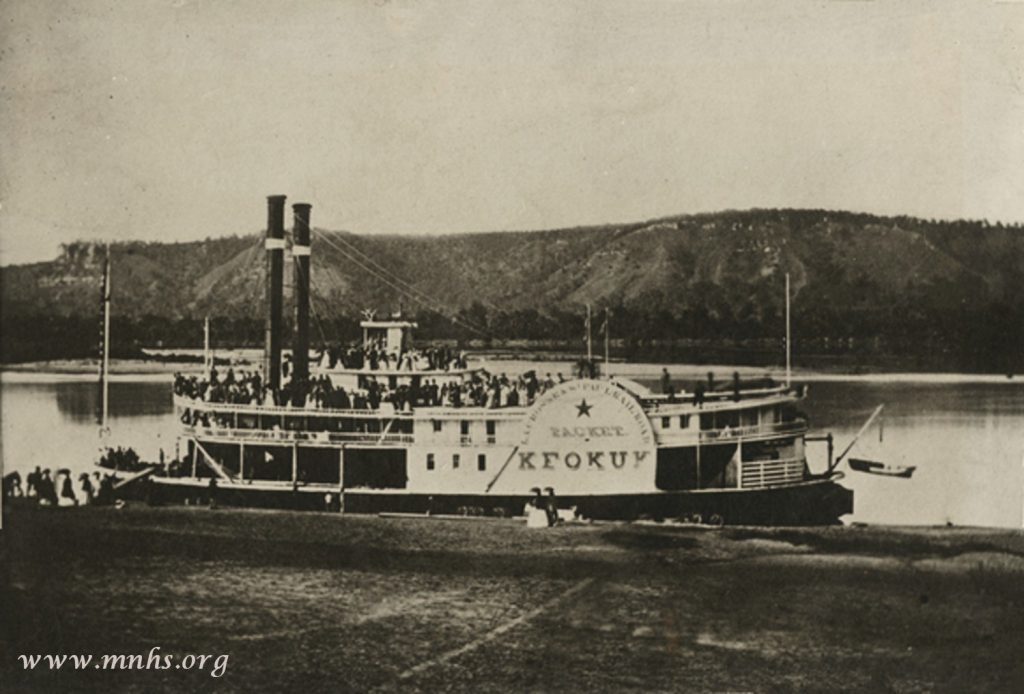
Photo: MN Historical Society
Loc # HE5.11K r11 – Acc # YR1940.7823
But just now Willie sees the steamer Keokuk, as we draw near La Crosse, waiting for passengers to make her quick trip to meet the cars. In a few moments she must leave. And now we see the captain, and get him to promise to wait till we pick up, change five trunks, and hand baggage enough for ten passengers. To do this all must be carried across barges and boats quite a distance. Willie leads Bro. Littlejohn, and we take charge of the rest. Soon we find ourselves on the Keokuk, bag and baggage, and away steams the boat up the river.
Editor’s note: One might visualize the scene of the transition between the steamship Minnesota and that of Keokuk. Imagine the passengers and baggage being carried across the waters on barges and boats while Willie led Brother Littlejohn through it all – leading him because Littlejohn was blind!
The boat connects, and we are safely on the train, and comfortably situated. This is a fine train of new cars, manufactured at Worcester, Mass. We shall probably reach the camp this afternoon (fifth-day) in season to make preparations, and put up for the night at the Cotton Hotel.
MINNESOTA CAMP-MEETING. Fifth-day, June 22 [sic – it was actually June 23], we reached the Minnesota Camp-ground in season to pitch our tent, and make preparations for the night. Active and willing brethren assisted, and we were liberally furnished with everything to make us comfortable. The turn out is very large for Minnesota. There are nineteen family tents upon the ground, besides the large tent, the boarding tent, and eight or ten covered wagons in which many lodge. We were pained to learn that our much-esteemed Bro. S. Pierce was not expected to be at this meeting on account of sickness. May God bless him in his afflictions at home, and, if it be his will, raise him to health, to be a blessing to the cause in this State.
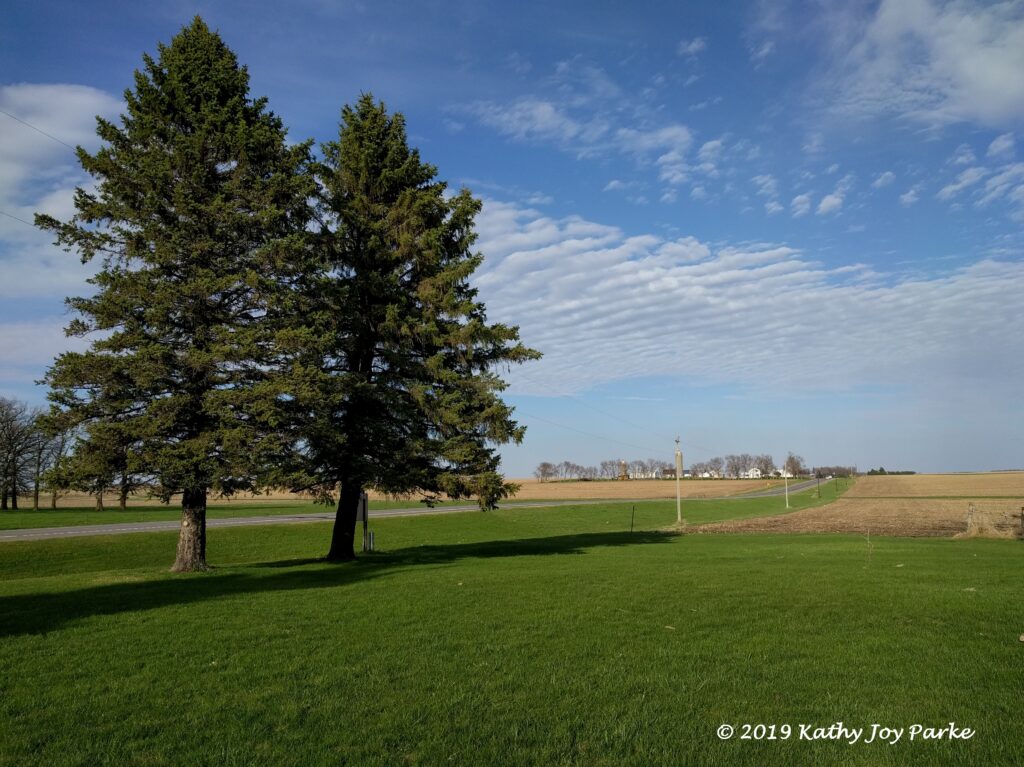
Photo: © 2019 Kathy Joy Parke
The first evening we spoke to a good congregation in the large tent. We took the position that the growing, spreading interest in the cause of present truth is a miracle of God’s power. That we are so pleasantly and happily situated on this ground, with sufficient interest in the cause to bring this body from different parts of the State, is a wonderful miracle. It is because God is in the work that his people hold on their way, and grow stronger and stronger.
It is admitted that men of learning and energy may build up a religious interest, provided the sentiments held do not require sacrifice of time, means, and the natural desires of the mind and heart. But let even learned and energetic men take their position on unpopular Bible truth; let them undertake to build up a religious interest which is full of sacrifices and crosses; let them take hold of the work in their strength, without God to help them, however learned and energetic they may be, they will make an utter failure.
The positions of Seventh-day Adventists are unpopular. The world is against us. Popular professors generally are ready to take a decided stand against us. The powers of darkness are ready to make war upon us. We have no ambition to rank among great men. We regard ourselves as small men, engaged, however, in a great work. And the only reason to be assigned why the cause of truth in our hands progresses, is because God’s hand is in it. We therefore conclude that we should have implicit confidence in God and in the message for this time; and should, with courage, press forward in the work to which God has called us.
Sixth-day, Bro. Littlejohn spoke in the morning, Mrs. W. in the afternoon, and we in the evening upon the subject of the kingdom. The social meetings of this day were very interesting. The brethren are settling into the work, and there is a good prospect of a glorious meeting. We find ourselves in the midst of an intelligent, energetic, and enterprising people. They bear much of the New-England stamp in these respects.
Sabbath morning. The weather is fine. The gathering of brethren is large. The morning meeting is deeply interesting. Confessions are being made. A shouting, exalted, self-righteous spirit in a few has been checked in a manner to have a good influence on the cause, and our social meetings are characterized with the sweet spirit of humility and love. The general prayer and conference meeting at 8 A. M., showed that the good work was still deepening in the hearts of the Lord’s people.
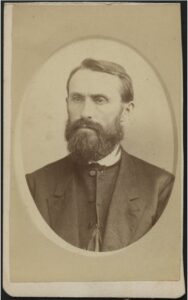
Photo: Center for
Adventist Research
Sabbath forenoon. Bro. Littlejohn spoke upon the subject of the Judgment. This was an appropriate subject at this stage of the meeting. The speaker was listened to with great interest. At half past one, we spoke to a large congregation for thirty minutes. Our Seventh-day Baptist brethren came quite a distance to meet with us; also many of the citizens of this locality were out to hear. Mrs. W. followed at two, and spoke with great freedom, clearly setting forth the Christian life. This effort told upon the congregation, which was not less than three or four hundred. We called on all who loved the Lord to unite in a covenant to serve him better, and love him more fully. Probably not less than two hundred arose. The scene was solemn and touching. Then we called upon backsliders and sinners who were ready to give themselves up to the Lord, and desired the prayers of his people, to arise. Many rose up. The front seats were vacated, and not far from one hundred came forward. This movement was marked with deep feeling. Earnest appeals were made by several, and the entire crowd was moved mightily. The work was general, and the surrender to the Lord seemed almost complete.

The afternoon meeting continued nearly five hours, with a short intermission, during which time, probably, not far from two hundred persons took part. Among them was Dr. Lee and his wife. Dr. Lee is an educated Swede. His testimony and that of his wife were to the point. We never witnessed greater advancement on the Sabbath at any meeting than at this. The several services of this day were so deeply interesting that they held, in all, not less than ten hours.
First-day morning, our social meetings were usually interesting. It was very evident that the work was deepening. At half past ten, Bro. Littlejohn spoke to a large audience. He was clear, forcible, and free; and the attention of the congregation, with hardly an exception, was decidedly candid and good. At the close, we circulated all we had of Bro. L.’s printed sermon on the Sabbath, and did not more than half answer the urgent demands. As we handed out the last one of the two hundred we had on hand, there were twenty hands reaching for it.

Photo: Ellen G. White Estate, Inc.
In the afternoon we spoke thirty minutes upon several points connected with the Sabbath question, to a large and very attentive congregation. We were followed by Mrs. W., who held the crowd with increasing interest for about forty minutes. At the close of this service, we circulated several hundred copies of Mrs. W.’s tract entitled, The Sufferings of Christ. Again we were pained, not being able to supply the eager crowd. Bro. Ingraham spoke with freedom in the evening on the subject of conversion.
Second-day morning meeting was full of interest. At an early hour we were assembled at the stand for general social worship. Again the call was made to backsliders and sinners to come forward. The front seats were soon filled. The brethren and sisters went to their children and friends who had not moved forward, and generally succeeded in inducing them to come forward. The interest of the meeting was at a high pitch. We bowed in prayer. God heard the prayers of his servants. We arose, and while singing, several brethren and sisters came forward, leading their friends with whom they had been pleading with many tears. Dr. Lee and wife spoke in a very touching manner. The Spirit of God came down upon us in a wonderful manner. And yet sinners and backsliders pressed forward. The congregation was large. Our Seventh-day Baptist brethren took a deep interest in our meeting. Many of them were present. Baptism being called for, those wishing the ordinance were requested to rise up. A number arose.
In the afternoon the congregation was assembled to examine candidates for baptism. About twenty-five were received, among whom were Bro. and Sr. Lee. The crowd at the water was very large and attentive.

In the evening the blessing of the Lord still rested upon us. Our union with the brethren in Minnesota became very strong. There is an efficiency and activity with this people which we do not always find in other localities. Their Conference Sessions were spirited, and marked with union. There was a general promptness in paying for our periodicals. Many paid liberally in advance for the REVIEW, Reformer, and Instructor. In consequence of the scarcity of money but few books were purchased. This we made up in gifts from the book fund, in full faith that our faithful brethren in Minnesota will make it up to the book fund when money shall be more plenty with them.

Our Danish brethren in Minnesota were out to Camp-meeting, They are among the most faithful friends of the cause. They anxiously inquire for Bro. Matteson. They think he would do more good among the Danish people. There is also an urgent call for his labors among numerous Danes in Black Hawk Co., Iowa. There is a very general feeling that Bro. M. has mistaken his field of labor. Under the instructions of the General Conference Committee, we think Bro. M. should labor for his people. He should translate many of our smaller works into the Danish language, that the Publishing Association may print large editions for general circulation among those in our country who read that language. And then, in our opinion, he should labor under the instruction of the General Conference Committee, much of his time, in connection with such Danish works as he shall prepare for that people. While we admire the enterprising, liberal, spirit of the Danes in instituting a Danish Tract Fund, we regret that our American brethren did not take this matter in hand, and act a liberal part in it. In fact, the General Conference should, and will, take Bro. Matteson, and the cause among the Danes, right up in its arms, and direct and nourish both him and it. We are much disappointed in not seeing Bro. M. at some, at least, of our Western Camp-meetings.
The business sessions of the Minnesota Annual Conference were harmonious, and the brethren are of good courage. The expenses of the Conference are liberally met, and the brethren donate $100 to the General Conference.

Photo: Center for Adventist Research
b26073110_k0001
Minnesota is a promising field of labor. Bro. Ingraham goes out with the tent alone unless some one can be found to go with him. We suggest that a Minnesota summer and fall might improve the health of Bro. Cornell or Waggoner. May God raise up faithful and able laborers in this great western field.
We were happily disappointed at the camp-meeting in Minnesota last fall, and have since thought of the brethren in that State with pleasure. But our joyful disappointment to see so many brethren from different parts of the State at the late camp-meeting, and in witnessing so much of the work of God among them, can hardly be expressed on paper. We feel the strongest union with this people, and shall do what we can to help them in their efforts to build up the cause in that new State.
JAMES WHITE. (Written from) Kilbourn City Camp-ground, Wis., July 1, 1870.
Review and Herald, July 5, 1870, 21-22.

Photo: Sandra Smith
The Tents of Jacob. – “How GOODLY are thy tents, O Jacob, and thy tabernacles, O Israel.”
These words were brought to mind at our late campmeeting at Wasioja, Minn. To look at that circle of tents, with the large one in the center, to hear the songs of praise, and the voice of prayer, all conspired to render the scene deeply interesting. There for the first time we attended a regular camp-meeting among the peculiar people, called Seventh-day Adventists. They do not appear to be entirely indifferent to the opinions of others, having some of the leading characteristics of our common humanity; but they do not seem disposed to ask pardon for believing as they do, nor for what they do.
Having cast in my lot among them, I had a great desire to see and hear from those tried servants of the Lord, concerning whom the tongue of slander had not been silent.
Bro. and Sr. White seemed to have the gospel armor fully on; and Bro. Littlejohn was able to rightly divide the word of truth. But it was not preaching self, but Christ Jesus the Lord.
There is no mistake, the Lord is in this work. How interesting the scene, to behold two or three thousand listening to the word of life.
May the word preached be received into good and honest hearts, and bring forth fruit unto holiness, that the end may be everlasting life. May the truth, the present truth, as now being declared, make us free, and be carried out in all the varied departments of life. And let us never forget that it is through faith and obedience, that we are to secure eternal life, through Jesus Christ our Lord.
Thos. J. CROSS. Blue Earth Co., Minn.
Review and Herald, July 19, 1870, 35.
Learn more about these leaders:
(external sources)
Littlejohn, Wolcott H.
Matteson, John G.
White, Ellen G.
White, James S.